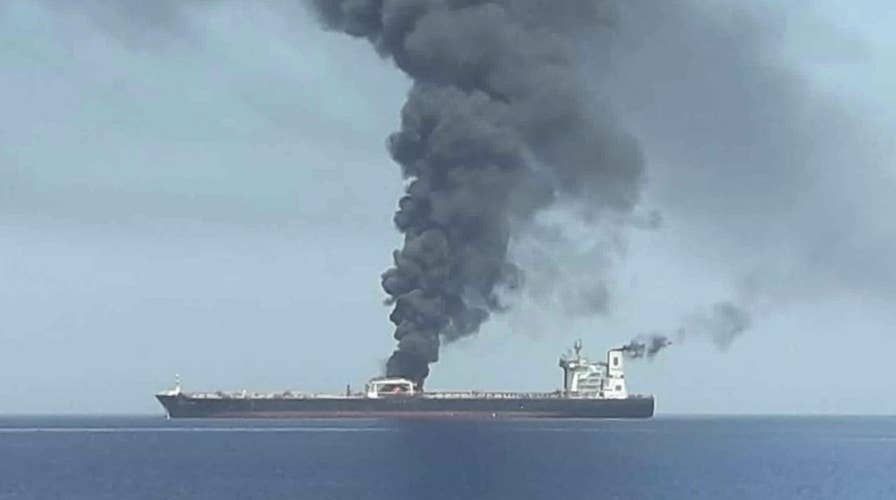President Trump says Iran is responsible for tanker attacks in the Gulf of Oman
Iran rejects Trump's assertion, accuses U.S. of 'sabotage diplomacy'; Kevin Corke reports from the White House.
In light of the most recent attacks on civilian oil tankers in international waters in the Gulf of Oman, the Trump administration must now be prepared to escort tankers transiting the Strait of Hormuz to protect oil shipments in that vital passageway.
Although such American protection of U.S and other tankers would risk a direct military confrontation with Iran, failing to respond to these attacks in waters through which 35 percent of the world’s seaborne oil shipments flow would not only endanger global trade and economic growth, but invite more aggressive action by the Islamic Republic of Iran.
The U.S. cannot accept a sustained threat to navigation in the Strait of Hormuz. International rights, U.S. credibility and billions of dollars in economic interests are at stake.
DAVID ADESNIK: TRUMP SHOULD GET TOUGHER WITH IRAN AFTER IT ATTACKS OIL TANKERS
Secretary of State Mike Pompeo signaled in his news conference Thursday that Washington may well be considering such action. He called the unprovoked attacks on the civilian tankers of two American allies “a clear threat to international peace and security.” Such language is commonly used in the United Nations Security Council as a justification for military action.
Iran has denied responsibility for the attacks, accusing Washington of “warmongering” and waging an “Iranophobic campaign of disinformation” against it.
But Pompeo said Thursday that U.S. intelligence agencies have concluded that Tehran was to blame for the strikes on the vessels of Norway and Japan, two close American allies.
Video footage released later by U.S. Central Command showed an Islamic Revolutionary Guard Corps patrol boat pulling alongside the Kokuka Courageous hours after the initial explosion and removing an unexploded limpet mine from the stricken Japanese ship.
The twin attacks appear to be the latest effort by Tehran to step up military action aimed at forcing the U.S. to ease financial pressure resulting from crippling American economic sanctions.
Iranian escalation seems to reflect a judgment by Tehran that the status quo and its de facto policy of strategic patience are unsustainable. Iran feels betrayed by both President Trump’s decision early in his administration to withdraw from the nuclear agreement known as the Joint Comprehensive Plan of Action and the choking sanctions imposed on Iran soon after.
People and nations tend to become less averse to risk when they see themselves as threatened or wronged.
Escorting tankers is not without risk for the U.S. In 1987 and 1988, Washington provided naval escorts for oil tankers transiting the Gulf when Iran was threatening commerce through the strait as part of its eight-year war with Iraq.
President Ronald Reagan’s administration even reflagged Kuwaiti vessels as American to protect their precious cargo. The escort resulted in a confrontation with Iran in which Iranian sailors were killed.
But Iran’s ragtag flotilla is no match for the U.S. Navy, which would quickly overwhelm further attempts to use force against lawful commerce.
Still, accidents, misperceptions, unprofessional seamanship, or hotheads could all spark a naval skirmish that could escalate.
History suggests that American commanders should not permit small boats to approach their vessels. Given Al Qaeda’s attack on the USS Cole in 2000 in port in Aden, Yemen and the deadly 2017 bombing attack on a Saudi frigate by an unmanned bomb craft in the Red Sea, weapons will be on a hair trigger.
However, such a direct confrontation is in neither America’s nor Iran’s strategic interest. It would be far better for the two enemies to return to the negotiating table.
President Trump has sent decidedly contradictory signals – calling on one hand for negotiations and threatening by tweet, on the other hand, the “official end of Iran.”
CLICK HERE TO GET THE FOX NEWS APP
Such incoherence is unlikely to reverse Iran’s nuclear ambitions or end its provocations. After the twin attacks, Iran’s Supreme Leader Ayatollah Ali Khamenei flatly rejected talks, stating: “I do not consider Trump a person worth exchanging any message with.”
Asked in response, President Trump tweeted: “It is too soon to even think about making a deal. They are not ready, and neither are we.”
CLICK HERE TO READ MORE BY JUDITH MILLER
William Tobey is a senior fellow at the Belfer Center for Science and International Affairs at Harvard University. He is a former deputy director of the U.S. nuclear stockpile who served on the National Security Council under Republican and Democratic presidents.

